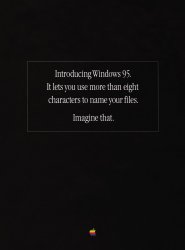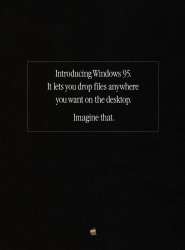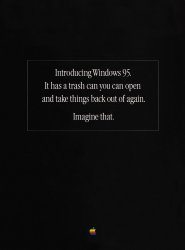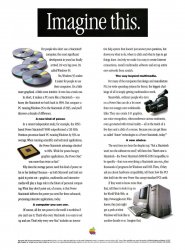whooleytoo said:
[snip]
Fair enough, though just in the interests of balance it should be noted many of Apple's technologies have been bought in/borrowed from too -
OSX, Cocoa & development tools...
The problem is that many of the people at NeXT came directly from Apple. NeXT went in directions Apple had decided not to pursue, even though they had started down those paths.
Other examples of technologies that started with Apple are tablet computers and PDAs. Part of the problems with the Newton when it first came to market was the fact that those two projects ended up being merged which forced the Newton to be larger than the original PDA design in order to package the computing abilities originally intended for the tablet system.
But this thread really doesn't need to be
balanced by looking at Apple... Apple doesn't attempt to justify it's antitrust violations by claiming
innovation. In almost 20 years of litigation Microsoft has been fined over a billion dollars, all the while claiming that it's practices were needed for
innovation.
In reality, Microsoft has taken the stance that it is easier (and in the long run, less expensive) to watch and wait for new technologies, and then buy their way into any new market. Once in that market their most common practice is to
embrace and extend any established standards to pollute the environment for it's competition.
Examples are easy to point out... Java, HTML, MPEG4, MP3... and now PDF is in Microsoft's sights. And it seems no amount of fines will ever match the profitability of these tactics.
And it isn't like they don't know what they are doing. They knew they were doing this while claiming
innovation. And now they are even outlining what they need to do differently... claiming that (like their claims of
innovation) they are going to self impose these changes which they have fought against all these years, and which over a billion dollars in fines hadn't been enough to get them to change.
Funnily enough I was pretty sure Quicktime was based on technology bought in from SuperMac or Radius, but I can't find any reference to it now.
Both these companies worked closely with Apple to provide hardware solutions for video capture on Macintoshes. Apple didn't have any hardware ability to capture video early on in QuickTime, and these companies help solve those issues. I have a SuperMac Nubus video capture card from 1993, which predates Apple's first Mac with built in capture abilities released later that year (the Quadra 840av).
Apple has a long history of working closely with third party hardware venders. Apple didn't create SCSI, nor did they create Nubus (that was from Texas Instruments).
Odds are that you are mistaking Apple working closely with third party hardware suppliers with how Apple developed QuickTime. But Apple had to also work closely with both Adobe and Avid to produce the first major pieces of QuickTime authoring software, and I don't see anyone claiming that Apple bought QuickTime from either of them.
__________________
IJ Reilly said:
The 1985 agreement for Microsoft's use of Mac interface elements went beyond Excel. Apple thought they were licensing for Windows 2.x as well, but not beyond. When these elements appeared in Windows 3.0 (the first Windows to matter), Apple sued Microsoft in what became the infamous "look and feel" lawsuit. This suit was whittled down bit by bit by the judge until in the end it was dismissed.
But from Apple's point of view at the time, Microsoft's intentions seemed innocent enough... Windows would provide a shell to let Excel run on DOS systems. And from Apple's point of view (again, at the time) the idea of firing up a shell to run Excel or any other GUI app in DOS hardly made DOS competition for the Mac. And the benefits of Microsoft software on Macs seemed to out weigh the benefit to PCs.
When Windows started to be a user environment beyond running a handful of apps, that was what woke Apple up to the mistake.
I mean, do you really think that if PCs were running
MS-DOS 2006 Professional and all the apps had to use a shell to run in GUI mode today that Apple would have had any problem with that? Of course not.
The main reason this occurred, from what I've read, was the ambiguities of the 1985 agreement. Later, John Scully would call this one-page license agreement the dumbest thing he ever did as CEO of Apple.
...Apple certainly learned it the hard way.
But Scully (though in charge at the time) shouldn't take the full blame. The reason companies have legal counsel is for things like this.





